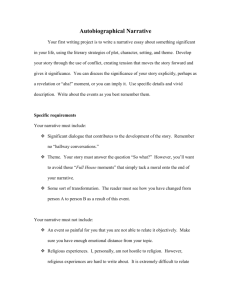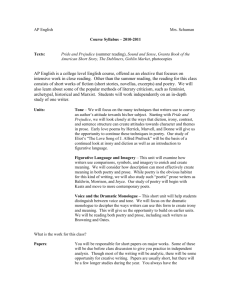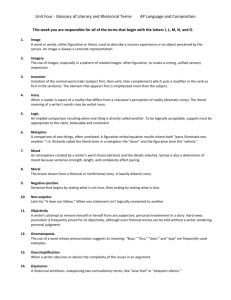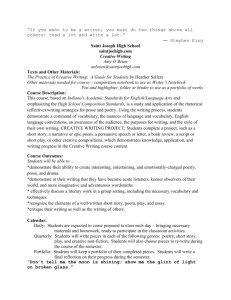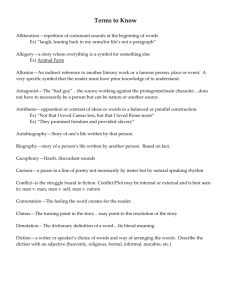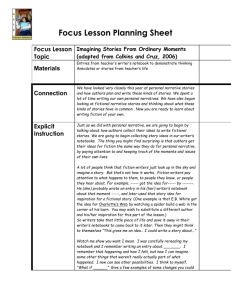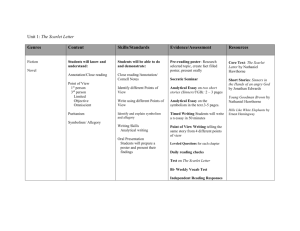Short Story Terms - Catawba County Schools
advertisement
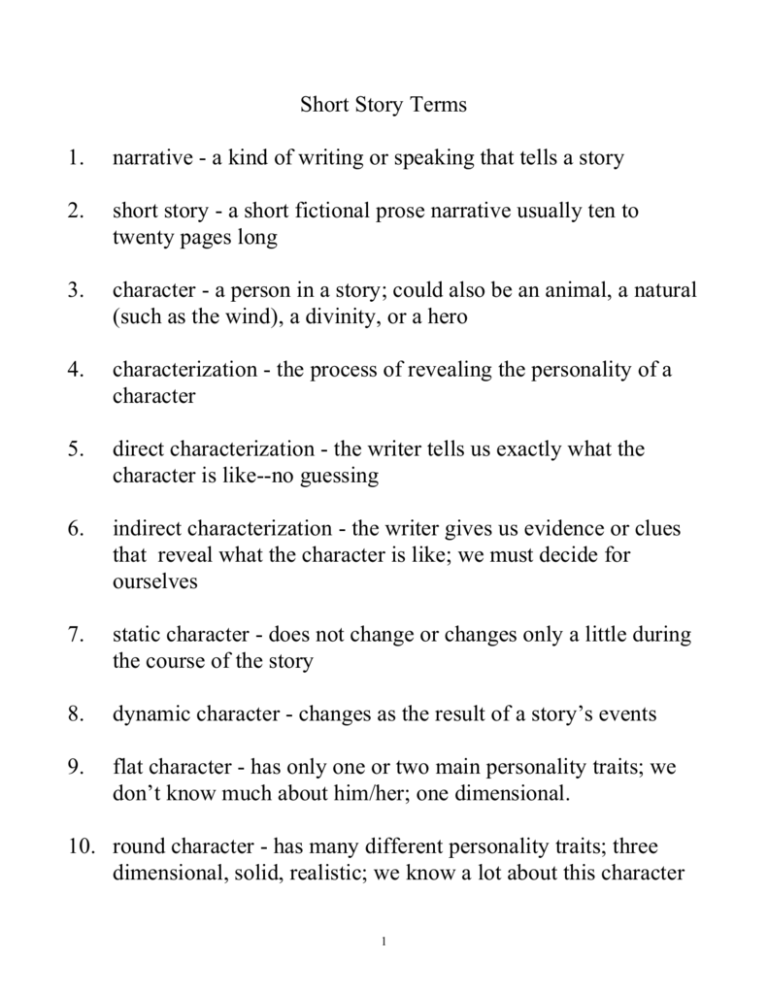
Short Story Terms 1. narrative - a kind of writing or speaking that tells a story 2. short story - a short fictional prose narrative usually ten to twenty pages long 3. character - a person in a story; could also be an animal, a natural (such as the wind), a divinity, or a hero 4. characterization - the process of revealing the personality of a character 5. direct characterization - the writer tells us exactly what the character is like--no guessing 6. indirect characterization - the writer gives us evidence or clues that reveal what the character is like; we must decide for ourselves 7. static character - does not change or changes only a little during the course of the story 8. dynamic character - changes as the result of a story’s events 9. flat character - has only one or two main personality traits; we don’t know much about him/her; one dimensional. 10. round character - has many different personality traits; three dimensional, solid, realistic; we know a lot about this character 1 11. setting - the time and place of a story or play; could be past, present, future, day, night, spring, summer; often the setting is crucial to the story. 12. plot - the series of events that make up a story; the plot usually follows this pattern: exposition, complication, climax, resolution 13. exposition - (introduction) tells us about the characters, setting, conflict, etc.; tells us all we need to know to understand the story 14. complication - (rising action) the story becomes more interesting as the characters interact with each other and take steps to resolve the conflict 15. climax - the most exciting time in the story as the outcome is decided; we know what is going to happen—how the story is going to end 16. resolution - (falling action, denouement) all the conflicts are resolved and the story ends 17. conflict - the problem that must be solved; a struggle or clash between opposing people, forces, needs, desires, or emotions 18. external conflict - a character struggles against outside forces 19. internal conflict - takes place in a character’s mind 2 20. theme - the central idea in a work of literature; the idea a writer wishes to convey about a subject (a theme is not a subject—a subject is what is what is written about); the theme is usually not stated directly; it is usually implied 21. point of view - the vantage point from which the writer chooses to tell the story; three possible points of view: 1) omniscient, 2) third-person limited, 3) first person 22. Omniscient point of view - all knowing; the person telling the story (the narrator) knows everything about the characters and their problems 23. third-person limited point of view - the narrator focuses on the thoughts and feelings of just one character; we see everything through that person’s eyes 24. first-person point of view - a character actually tells the story, using the pronoun “I” 25. Second person - designated by the pronoun you. There is no second person point of view in storytelling. 26. Tone - the attitude a writer takes toward the audience, the subject, or a character 27. Comedy - a story that ends happily 3 28. tragedy - a play, novel, or other narrative that depicts serious and important events and the main character usually comes to an unhappy end due to a tragic flaw or weakness in his/her character 29. stereotype - a fixed idea or conception of a character that doesn’t allow for any individuality; based on racial, social, religious, sexist, or ethnic prejudices. Examples: All New Yorkers are rude; all Texans are rich and wear over-size cowboy hats; all Southerners are dumb. 30. satire - a kind of writing that ridicules or pokes fun at something in order to reveal a weakness in society, a person, a belief, etc. Example: “All in the Family” 31. symbol - a person, place, thing, or event that stands for itself and for something beyond itself as well; has its own real or literal meaning, but also means something else. Examples: a wedding ring, the Pillsbury Dough Boy—Poppin’ Fresh, a stop sign, an eagle, the American flag 32. irony - in general, a contrast between what you expect and what really happens, between what is said and what is meant, between what appears to be true and what really is true 33. verbal irony - when a writer or speaker says one thing but really means something else—usually opposite 34. situational irony - a contrast between what we expect to happen and what really happens 4 35. dramatic irony - when the audience or reader knows important information that a character in a book, play, TV show, etc. does not know and that would cause that character to act differently. Good examples: soap operas 36. foil - a character who is used as a contrast to another to intensify, accentuate, or make that character stand out. Example: Dr. Watson in Sherlock Holmes stories 37. foreshadowing - the use of clues that hint at events that will occur later 38. flashback - a scene in a movie, play, short story, novel, etc. that interrupts the action to go back and tell what happened at an earlier time 39. farce - a type of comedy in which ridiculous and sometimes stereotyped characters are involved in far-fetched, silly situations 40. fable - a brief story that teaches a moral or practical lesson about how to get along in life. Example: pg. 871 in CP lit book 41. dialect - a way of speaking that is characteristic of a particular region or group of people 42. denotation - the literal dictionary definition of a word 5 43. connotation - all the meanings, associations, or emotions a word suggests. Example: “Skinny” and “slender” have approximately the same meaning, but “slender” is perceived to be more of a compliment than “skinny” in the minds of many people. 44. allusion - a reference to a statement, person, place, event, or thing that is, or should be, well known to most people; usually taken from literature, history, religion, mythology, politics, sports, science, pop culture 45. allegory - a story in which the characters and settings and events stand for certain other people or events or concepts; allegories have two meanings—a literal meaning and a symbolic meaning; allegories are often used for teaching purposes 46. diction - a writer’s or speaker’s choice of words; slang is appropriate in writing a letter to a friend, but it is not appropriate in writing a paragraph for a classroom assignment; a scientist would use different words than a poet would use even if both were describing the same tree 47. protagonist - the chief character in a story, play, novel, etc. 48. antagonist - the rival or adversary of the protagonist who works against him/her 49. archetype - the original model or pattern from which copes are made, or out of which later forms develop; a character, in the literature of a culture, of which you will find examples in all or most other cultures. Examples: the devil, Santa Clause 6 50. anecdote - a short summary of a funny event 51. cliché - a word or phrase that is terribly overused, like “busy as a bee” or “I slept like a log”; a trite expression 52. epithet - a word or phrase used in place of a person’s name to help characterize the person. Examples: egg head for a very smart person, four-eyes for someone who wears glasses 53. fantasy - highly imaginative writing that contains elements not found in real life 54. genre - a French word meaning form, type, or kind. Literary genres include novel, essay, poetry, play, short story, etc. 55. hero - a character whose actions are inspiring or noble, and who usually overcomes difficulties 56. historical fiction - stories that center upon or incorporate some significant historical events 57. mystery - a story that involves the reader in guessing who committed the crime or deed 58. myth - a fictional tale that explains the actions of gods or heroes, or the causes of natural phenomena (such as lightning and thunder), or both. Myths can be Greek, Roman, Norse, or Celtic in origin. 59. oxymoron - two words used together that contradict each other, as in icy fire or sweet sorrow 7 60. paradox - a statement that seems to be contradictory but that actually presents a truth 61. poetic justice - when a character “gets what he deserves” 62. pseudonym - the assumed or false name of an author; Samuel Clemen’s pseudonym is Mark Twain. 63. pun - a play on words when a word has more than one meaning 64. science fiction - fictional stories that center upon scientific elements. Some science fiction stories written in the past have actually been predictors of things we have today (robots) or events that have actually taken place(space travel). 65. stream of consciousness - a narrative technique, or point of view, that presents thoughts as if they were coming straight from a character’s mind, with story events and character’s feelings combined 66. style - an author’s unique way of writing that involves word choice and sentence patterns 67. nostalgia - a wistful or excessively sentimental sometimes abnormal yearning for return to or of some past period or irrecoverable condition; homesickness. Sometimes stories evoke, or make us feel, nostalgia. 8 68. prose - the ordinary language that people use in speaking or writing; a literary medium (kind of writing) that is distinguishable from poetry because of its format; it is written in paragraphs, while poetry is written in stanzas; any form of writing that is not poetry. You find prose writing in novels, short stories, essays, newspaper articles, magazine articles, etc. 69. plot summary – a paragraph that briefly lists the main events of the story, scene, chapter, etc. 70. fiction – narrative writing drawn from the imagination of the author rather than from history or fact 9
